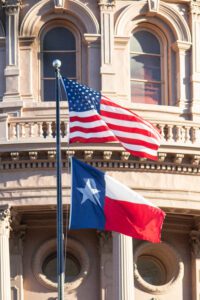School Vouchers 101
What are School Vouchers?
School vouchers are taxpayer-funded subsidies given to private schools and vendors without transparency and accountability for results. Current conversations in Texas refer to them as a “school choice” option. They also often go by a variety of other names, including education savings accounts (ESAs), tax credit scholarships, and virtual or special education grants, to name a few.
Regardless of what you call them, school vouchers and ESAs siphon public dollars away from public schools without the accountability and transparency required of traditional public schools. That’s a problem because accountability and transparency are strongly favored by Texans.
In fact, a recent survey of Texans found 88% of respondents agreed that if private schools received state funding, they should publicly report all school finances (Source: Charles Butt Foundation Poll, 2023).

TEXAS NEEDS TO LEARN FROM OTHER STATES
As funding for voucher programs has expanded in other states, the overall portion of state funding for public schools has decreased. Research shows that public school students who use vouchers don’t stay in voucher programs long-term, returning to their public schools. Vouchers also typically don’t cover the full cost of private school tuition, making it a tax subsidy for higher-income families. Those are just a few of the lessons from other states that Texas legislators should consider in examining any voucher legislation.
Legislators can look to Arizona and Florida to see the negative impacts of school vouchers on students, public schools, and state budgets.
>> A growing body of credible research about school vouchers finds voucher programs often fail to serve students from disadvantaged or marginalized backgrounds, and the impact of vouchers on student achievement is either insignificant or mixed.
Other states’ experiences make it clear that voucher programs are a risky business. Specifically, vouchers pose a risk to state budgets, students and families, rural schools, and special education students.
WHY VOUCHERS ARE RISKY FOR STATE BUDGETS
>> Arizona’s universal school voucher program, which was estimated to cost $65 million, cost over $700 million.
>> As funding for voucher programs has expanded in other states, the overall portion of state funding for public schools has decreased. Florida is just one example. While Florida increased its spending on three voucher programs by 313% from fiscal year 2008 to fiscal year 2019, the state decreased its per-pupil funding for public education over this time period by 12%.
WHY VOUCHERS AND ESAS ARE RISKY FOR TEXAS STUDENTS AND FAMILIES
ESAs allow parents to hold public funds in an account to be used for private school tuition, homeschooling, private tutors, online courses, and purchases from an array of private vendors.
Because ESAs are often unregulated and not accountable for results, they present a real danger for fraud and misuse of taxpayer funds. In other states, as ESAs are adopted and new money flows, “microschools” and other fly-by-night educational centers are popping up in shopping centers and other temporary locations to offer services in return for ESA funds. Without strict regulations, regular audits, and transparent reporting of student academic results, ESAs can misuse public funds and harm students’ potential for learning and achievement.
Sources: Why I’m Wary of Universal Savings Accounts. Thomas B. Fordham Institute. February 16, 2023; Six Big Problems with Education Savings Accounts. Forbes. February 1, 2021
WHY VOUCHERS ARE SO RISKY FOR RURAL TEXAS
Headlines and reports abound regarding the potential hazards for Texas families, schools, and communities if vouchers are adopted in Texas. Rural Texas in particular could suffer if funding is removed from public schools, the lifeblood of many small communities, as well as a major employer in many areas.
And even though many small towns do not currently have private schools to accept voucher funds, other states have demonstrated that loosely regulated Education Savings Account (ESA) vouchers promote the creation of new pop-up schools and programs from vendors who are willing to accept voucher funds, but are not willing to provide transparency or accountability for student learning.
WHY VOUCHERS ARE RISKY FOR STUDENTS WITH SPECIAL NEEDS
Texas public schools are required to educate every child who shows up to their doors, regardless of income, disability, IQ, religion, national origin, gender, sexual orientation, income, academic ability, or athletic ability. Many voucher programs, including Education Savings Accounts (ESAs), claim to serve students with special needs by allowing voucher funds to go toward private schools or special education services. But these private schools and vendors are under no obligation to accept or serve students with special needs. And even if a student with special needs attends a private school with a voucher, they will likely forfeit the protections they have under federal law.
While public schools continue to strengthen and diversify services for students with special needs, the guarantees public schools offer are essential to these families. In public schools, students are guaranteed admission, transparency of funding and services, accountability for academic performance, and protections under the Individuals with Disabilities Education Act (IDEA), which private schools are not required to follow.
VOUCHERS AND THE 89TH LEGISLATIVE SESSION
The Texas Legislature considered several voucher proposals during the 88th Legislative Session, but legislation did not pass, continuing decades-long defeats of school vouchers in the Texas Legislature.
The Texas State Constitution outlines the duty Texas has to make suitable provisions for and maintain an efficient public education system. Any vouchers passed in Texas should not take away from the goal of educating the 5.5 million students currently enrolled in Texas public schools – young Texans who are the future workforce and driver of our economic success for the long term.
The 89th Legislature should focus on investing in public schools and strengthening the teaching profession, so current and future generations of Texans will continue to have high-quality educational choices in our neighborhood public schools.
Types of School Vouchers
Whether it’s calling them “grants,” “tax credits,” “scholarships,” “debit cards,” or “savings accounts,” voucher supporters have tried many tactics to divert taxpayer dollars from public education and students. The vendors and private schools who would benefit from voucher programs do not have to comply with the same rules and standards that ensure accountability, transparency, and access for all students. Any use of state funds for private educational purposes is a voucher.

Traditional Vouchers
Strip money from public schools in the form of grants parents can use for their children to attend private schools.

Education Savings Accounts
The state creates a taxpayer-funded account parents can use for private school enrollment and other educational services.

Tax Credit Scholarships
With this type of voucher, the state funnels tax credits to corporations or individuals who have donated to scholarship organizations that would pay for students to attend private schools.

Virtual or Special Education Grants
Often targeted at certain populations of students, including students with disabilities or who want to attend school remotely through a private vendor, these vouchers divert funds from our public schools to private vendors in an effort to create a statewide network of publicly funded private virtual schools.
